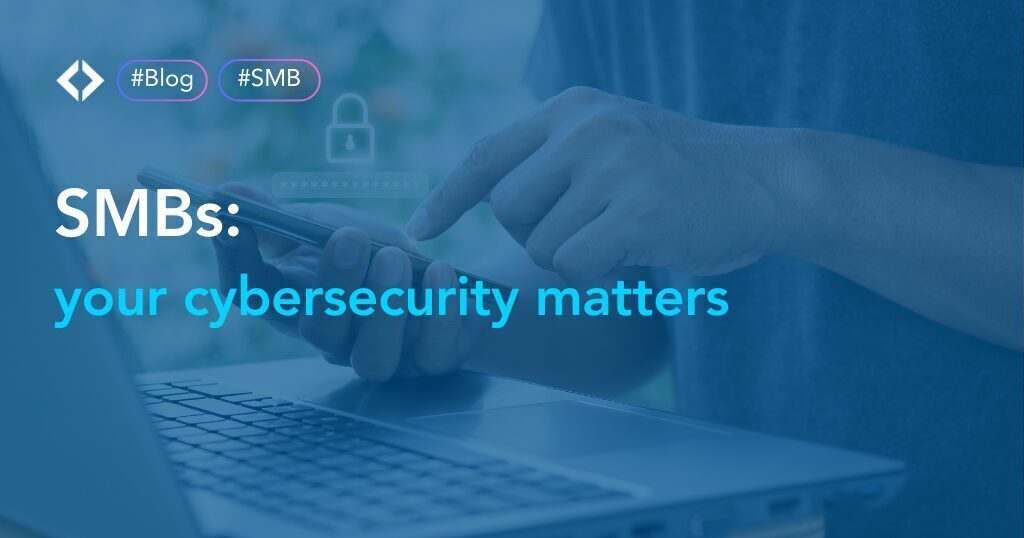Small and medium-sized businesses (SMBs) tend to think that they aren’t the primary focus of cybercriminals. Why would attackers target a small business when a corporation could yield a larger gain or more sensitive data? Unfortunately, this misconception is widespread among SMB owners, leading many to believe they are safe from cyberthreats. However, the numbers tell a different story: a recent study found that small businesses represent 43% of annual cyberattacks.
In a world where cyber threats are not only increasing in number but also becoming more sophisticated, ignoring the risks a company faces leaves it unprepared and vulnerable. In France, for example, According to the French National Agency for the Security of Information Systems, 54% of SMBs believe they won’t be targeted by a cyberattack because they think their size makes them less appealing, assuming attackers will prefer larger companies. By downplaying the possible risks they face, SMBs inadvertently make themselves more exposed to threats and even more attractive to cyberattackers.
SMBs experience specific challenges when it comes to cybersecurity. These challenges restrict their scope of action in implementing effective security measures. Yet, as we will explore in this article, SMBs are prime targets for threat actors, and the consequences of attacks can be devastating for them.
I. Cybersecurity for SMBs: a challenge
SMBs often find cybersecurity to be a significant challenge for their company. They commonly face similar problems: a lack of knowledge, equipment, staff, and, of course, budget. These issues, combined with a general tendency to minimize the real risks they face, lead them to deprioritize the protection of their business.
General knowledge about cybersecurity remains limited to those working in or interested in the field, resulting in significant security gaps. This is particularly evident in SMBs, where this lack of awareness prevents them from having the proper equipment to defend themselves, often solely relying on antivirus software to protect the entire company. Yet, as mentionned before, this is far from sufficient to combat modern, AI-powered cyberthreats, leaving these businesses highly vulnerable. Even when some equipment is in place, dedicated cybersecurity staff is usually absent, as 82% of SMBs rely on their CEO to handle their company’s cybersecurity.
Budget constraints are another major hurdle in developing a robust cybersecurity strategy. Reports indicate that 68% of SMBs allocate less than 2,000 € annually to cybersecurity. However, this necessary investment will remain insufficient as long as SMBs fail to recognize that they are prime targets for cyberattacker.
II. Why are SMBs prime targets of cyberattackers?
While the challenges SMBs face when it comes to cybersecurity are valid, cyberattackers are also well aware of them. And they will not hesitate to use them. For example, threat actors know that SMBs often rely on antivirus software in an attempt to protect themselves and they understand how easily these can be bypassed. Furthermore, they are also know that, even when SMBs do have the proper equipment, they often fail to update software or patch vulnerabilities, due to a lack of knowledge or staff. This makes it much easier for attackers to target SMBs.
And, SMBs do offer great rewards for cyberattacks. For example, in the case of a ransomware attack, an SMB is more likely to pay the ransom than a large corporation, as it often cannot afford the significant costs associated with a data breach. Phishing attacks are another example: SMBs typically lack extensive training on social engineering attacks, which increases the likelihood of phishing attempts being successful.
Finally, SMBs play a crucial role in supply chain attacks. They are often used as entry points to target larger companies and corporations. By attacking an SMB that provides goods, services, or technology to larger organizations, cybercriminals can easily gain access to those organizations. Since SMBs often have weaker cybersecurity measures in place, they become the weak link in the supply chain, providing an indirect pathway to larger companies with more lucrative assets.
III. Consequences of cyberattacks
The impact of cyberattacks on SMBs tends to be more damaging than attacks on corporations. It is more expensive for a small business to be the victim of an attack. The average cost of a cyberattack on an SMB is $255,000 and can reach up to $7 million. A cyberattack can be a significant financial burden on a small business owner, leading to lost revenue, reputational damage, and, in extreme cases, business closure.
This is why, for some business owners, cybersecurity tools and protocols are seen not only as a protective measure but also as a competitive advantage. Businesses that can quickly detect and neutralize cyberattacks are able to minimize downtime, safeguard critical data, and maintain their reputation for reliability. By stopping attacks quickly and preventing their consequences, companies can maintain their operations and ensure uninterrupted service to their clients.

